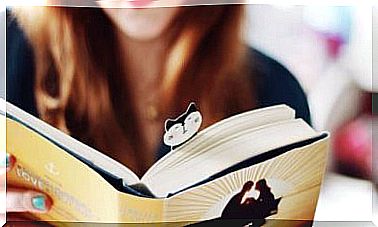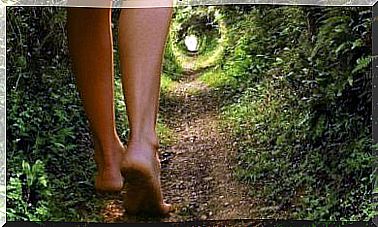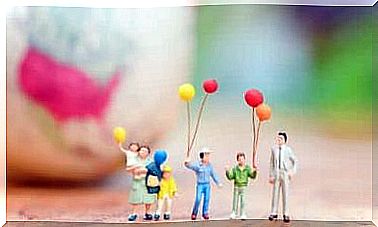7 Tips To Stop Biting Your Nails

A degree, a family reunion, a meeting, a long wait for the doctor. All these situations have something in common. In all of us, we can suffer from anxiety, worry or shyness. These feelings or thoughts can be expressed through words or through gestures such as biting the nails.
Our hands play an important role in our communication. With them we can embrace, caress and express ourselves. They can also express feelings such as restlessness, leading, the desire to end a meeting or even ugly expressions. Hands can express so much and our nails can be an expression of our feelings and thoughts. For many people, biting their nails is a way of channeling sensory sensations, albeit subconsciously.
In general, this behavior is seen as an act of coercion. We perform it to deal with our feelings of restlessness, anxiety and our intrusive thoughts. It has important consequences for our oral health, social image and in severe cases our self-esteem. Although it is a difficult habit to break, it is not impossible. If it is not a serious case, it only takes a little willpower, awareness and motivation.
The truth is that nail biting remains a mystery to psychologists, doctors and psychiatrists around the world. The journal Behavior Therapy and Experimental Psychiatry published an article claiming that nail biting was not a sign of nervousness, as many of us thought, but a sign of perfectionism. By performing this action, we can deal with our dissatisfaction or irritation.
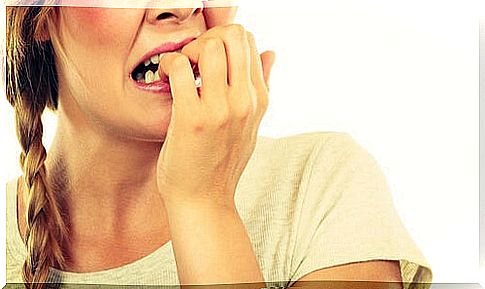
There are also studies that show that a third of those who suffer from nail biting are in a family situation where other family members suffer from the same behavior. Here we can see cases of children imitating their parents or older siblings who can not stop biting their nails. Other studies simplify the whole thing and relate nail biting to pleasure. The act of biting the nails creates pleasant feelings.
So it’s just a matter of willpower? Isn’t that just a cliché? They say that the only way to stop something or reach a goal is just a matter of willpower. “If you do not do it, it is because you do not really want it,” they say.
The truth is that this cliché is loaded with as many pros and cons. It is true that it gives us a simplified picture of reality. But it is also true that willpower and motivation (whatever it is) is the driving force and strength. Without them, we would not even be able to leave the starting block. But be careful, that will does not mean that the goal has been achieved, the work itself still remains.
Willpower does not move mountains but it is a very important starting point. It does not matter if you fail, make mistakes or if you do not bite your nails for a whole summer and then start when you get back to work. All endings are a new beginning. If one way does not work, try another. If you do not want to change what you do, change how you do it.
What went wrong last time? What mistake did you make? Do you remember how it felt when you got it right, and then started again? When you decide to start over, write a positive message to yourself, something that makes sense to you and put it somewhere where it is visible. It will help you when the temptation then becomes too strong. Just be aware all the time.
The most important first step towards correcting your mistakes is to be aware of them. At work, in your relationships, in the way you communicate and in terms of any activity you want to get better at. Fighting nail biting is a long distance race, not a sprint race. A good way to start is to take notes and monitor the times you bite your nails: where were you? What did you do?
Keeping records is a way to become aware of the activities you do or the people you are with when you bite your nails. The time of day, the places, whether you are driving, waiting at the traffic lights, etc. Be it at the beginning or end of the day. Each of these moments is important because they give you an idea of what it is that triggers you to bite your nails.

This prepares the brain and trains it to detect moments when you are at risk. First of all, you need to write down the times when you started biting your nails. When you check it, you can write down when you bring your hands to your mouth (without actually biting).
Ultimately, this exercise can help you realize when you are thinking about biting your nails. It’s an easy way to stop these automatic reactions.
Small steps lead to great achievements. The great enemies of motivation are the impossible goals. Maybe you have a special event or a job interview that makes you not bite your nails. This is paradoxical, because in the greatest moment of stress, you are neglecting your “weapon” to fight it – the risk of failure is greater.
At some point, you are doomed to forget the goal. You start biting your nails again and you feel like a failure. Do not put too much pressure on yourself to get rid of a habit that has probably been with you for several years. There may be those who succeeded in the first attempt. There are always those who talk about their last cigarette. But not everyone works the same way.
Trying not to be too hard on yourself is a good ally when temptation has struck your willpower. Try to limit it to one or two fingers or set a weekend or holiday destination. The combination of simple and easy goals will make us achieve the bigger goals over time. Every step counts and in the same way that we need to monitor the behavior we want to change, it is important to keep our progress on record.
After getting to know the situations, people or times of the day when you start biting your nails, the next step is to avoid temptation. We can not escape from these situations or the people all the time.
One of the best strategies is to use the power of our minds to confront them. Simply anticipate the situation and visualize how to get out of it without biting your nails. This can help you in difficult times. Turn your thoughts to alternative thoughts and think positive messages that can support you.
Another remedy is to train your body to breathe and relax to combat situations that create anxiety.
In the same way that we can train our body and our mind, we can also learn to avoid this behavior. A simple exercise is to bring our hand to the mouth. We leave it 5 cm from the mouth, resisting the impulse to bite on the nails. We hold it there for 20 seconds.
If we do this consciously, we train ourselves and we will become aware of it. It will then be easier to anticipate and identify the sensations that precede the act we want to avoid – biting our nails.
People who have struggled with a bad habit know how difficult it is. People around you will often show a lack of understanding and may comment on how weak you are. Sometimes visualization, willpower or mentalization is not enough. You may need to find other solutions. But do not forget that everyone is different. Some will succeed with one option, others with another.
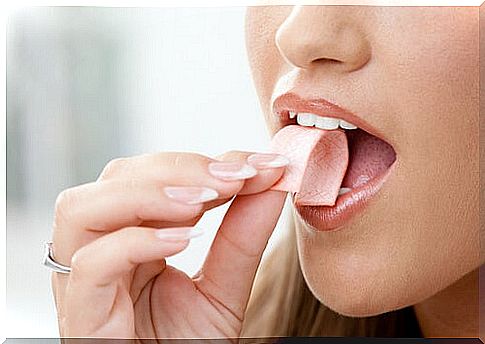
It is important to remember that we must focus on both the mouth and the hands. We may feel that we need to have something in our mouth to calm our nerves, restlessness or lead. In that case, we can use a chewing gum, ginger or licorice, caramels, etc. Having something removes the need to have your fingers there!
We must also focus on the fingers. Washing your hands, using gloves or nail polish, putting on a patch or invisible patches on your fingers can help. They will at least remind us of the goal we set for ourselves.
On the other hand, you can wear other items that can act as distraction, such as a keychain, an anti-stress ball, a pencil, etc. Anything that keeps your hands busy.
So there comes a time when our nails will start to grow, and that’s a weird feeling. We want to touch our fingers, look at them or stroke our fingertips. Another habit is to iron our new nails over our clothes. It is essential to avoid these gestures. Once we have trained ourselves to be aware of our behavior, it becomes easy to avoid falling for the temptation.
When we discover an unevenness or cut on the nail, a simple trick is to carry a small nail file with you. By doing so, we avoid smoothing out the annoying flaws with our teeth.
If at any moment you realize that you are about to do so, there are some tricks we can do. If you stand up, clench your fists. Look around for someone to start a conversation with. Put your hands in your pockets or put them under your song if you are sitting down.
It is often difficult for us to acknowledge when we succeed. Sometimes it’s because of how we grew up. fear of what others will say but we do not value our small progress. This can damage our self-image in the long run. If we have achieved a goal, then we should reward ourselves. We will not be less humble or think too much of ourselves by doing so.
Although for others it is insignificant progress, it should not stop us from rewarding ourselves when we have achieved something. It will certainly be very positive for our lives and goals.
Plan to give yourself small rewards if you have managed to go a week without biting your nails, for example. If those around you are involved in the process, it is certainly a good help. If they understand and sympathize, it is a great help.
We need to think about whether our problem is a health hazard or not. If we have bleeding or deformed fingers, or if there is a compulsive or depressive disorder, it is best to seek medical help. Doctors can help control and monitor the behavior and give us the advice and help we need.




